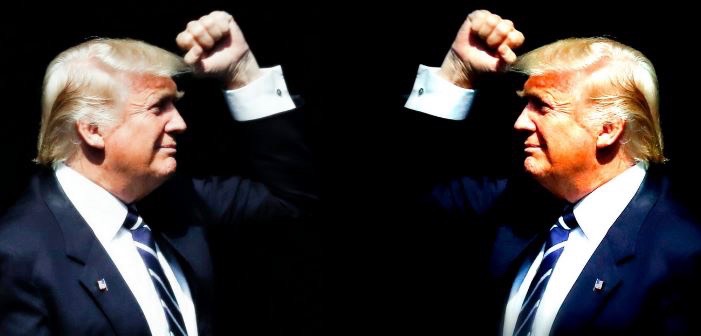
Donald Trump vs. Donald Trump
HAVANA — Although Donald Trump did not have the support of the political establishment during his campaign, after he gained the presidency of the United States and surrounded himself with the wealthiest Cabinet ever, I thought that a new version of the “cooperativist State” had been consummated.
As defined by U.S. journalist Naomi Klein, a cooperativist State is a government where, in practice, the dividing lines between public functions and the great entrepreneurial and financial interests disappear.
So, it was to be expected that — at least within the government team — the coincidence of interests would result in harmony. However, the Donald Trump variable altered the result of the equation. Only that explains the dysfunction that we’re witnessing in the current government of the United States.
An egocentric, ignorant, crude and quarrelsome man, Trump is an enemy-producing machine. Incapable of dealing with any human being who doesn’t worship him and obey the wildest of his commands blindly, Trump has broken away from any appearance of collegial governance. Nobel laureate Paul Krugman compared him to a hurricane that has swept away the rules of public administration.
Scandals, resignations and replacements have been constant elements of the barely eight months of his administration. Several investigations involving him, his relatives and closest advisers are ongoing. Although the Republican Party has a majority in both chambers of Congress, Trump has been incapable of unifying it and concretizing the laws that guarantee his political agenda.
His personal conflicts encompass a broad range of public personalities, the arts world and the media, which have closely watched his performance. He has insulted entire communities, from Muslims to Latinos, and was particularly insensitive in the face of tragedies such as those in Puerto Rico and Las Vegas.
It is difficult to find any other president who, in such a short time, has damaged the United States’ international credibility more than Trump. U.S. relations with its allies are going through their worst moment. His clashes with foreign leaders — who generally perceive him with a mixture of puzzlement, fear and contempt — are notorious. It seems the president respects no one, except for Vladimir Putin, which is one reason Trump is being investigated.
Both in domestic and foreign policy, Trump has behaved like a pyromaniac obsessed with putting a match to anything that smells like Barack Obama. A Republican senator as prominent as Bob Corker, chairman of the Senate Foreign Relations Committee and one of the few Congressmen who supported him during the presidential campaign, has said publicly that Trump is leading the world “on the path to World War III.”
Donald Trump is so toxic to the functioning of the U.S. system and capitalism in general, that we shouldn’t rule out his removal before his first term, as some predict. The mid-term elections next year will be an indicator of the force of such a trend.
However, this question can also be analyzed from another perspective. While Trump’s conduct is dysfunctional for the system, it is not necessarily so for his own political aspirations or personal interests because the system has become dysfunctional by itself.
Since the end of the Cold War, the United States’ military industry and the services associated with it have had to “invent” conflicts in order to sustain themselves. That’s called “the economy of disaster,” and it reached its zenith during the administration of George W. Bush. In essence, what appeals to these national and transnational groups is not world stability but selective chaos — and Trump identifies himself as the only one who can help them.
Predictably, he will gain the support of these sectors (very influential in U.S. politics) no matter how many Cabinet member resign or are dismissed, how much criticism Trump gets from the press, how many demonstrations are staged against him, or how many foreign dignitaries are horrified by his actions. He will be allowed to live his “reality show,” as Corker said, and will have to be kept within certain limits to prevent him from causing the end of the world.
To confront his opponents, Trump has an electoral base that has not decreased despite his nonsensical acts and statements. The reason is that he is supported by about 30 percent of the electorate. When Trump makes statements supporting the mistreatment of minorities; when he grants a pardon to sheriff Joe Arpaio, a torturer of immigrants, or calls for sanctions against athletes who criticize racism, he knows that he’s pleasing those voters.
They’re not a majority but they can be enough to elect him, because only 50 percent of registered voters usually vote. And it is hard to oppose them because the Democrats are going through their own credibility crisis, because there’s practically no organized left, because the unions are not capable of representing the workers, and because the social movements are dispersed and divided.
Most likely, if Donald Trump loses the 2020 election (to which he has practically announced his candidacy), it won’t be because of the potency of an opposing candidate (which the U.S. system is not in a condition to produce) but because of his own ability to mobilize so many people against him.
Perhaps, in the long run, it will be Donald Trump who defeats Donald Trump. Meanwhile, we need to fear his tweets.

